May 26, 2025 | 08:44 GMT +7
May 26, 2025 | 08:44 GMT +7
Hotline: 0913.378.918
May 26, 2025 | 08:44 GMT +7
Hotline: 0913.378.918
That is the innovative technology by Vifarm Joint Stock Company (Coastal Road, Ward 12, Vung Tau City) owned by Cao Nhat Anh Tu, born in 1986.
Vifarm's organic vegetable farm located on Coastal Road, Ward 12, Vung Tau city has an area of over 4,000m2, but only 2 workers are in charge of cultivating and harvesting. If you wish to visit the farm, you must go through various layers of doors and disinfection.
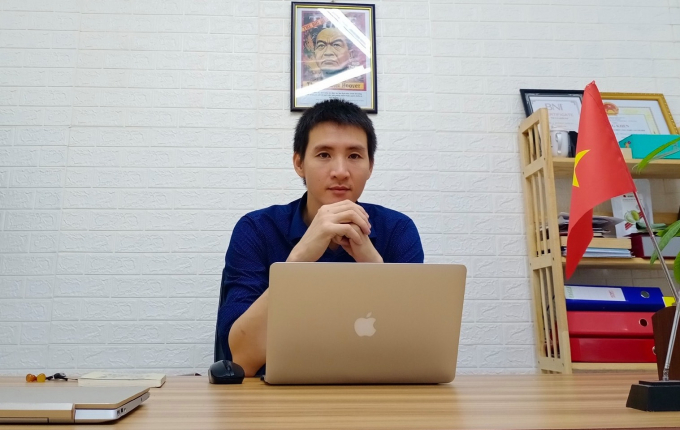
Cao Nhat Anh Tu, Director of Vifarm Joint Stock Company. Photo: Hong Thuy.
The farm is divided into separate zones, such as a hydroponic reflux zone, growing leafy vegetables such as water spinach, bok choy, collard greens, purple lettuce...; Israel's drip irrigation technology zone, growing fruit vegetables such as Dutch cucumbers, cherry tomatoes, squash, melons, cantaloupes...
Cucumber particularly, when matured can reach 300 grams/each. All vegetables and fruits grown at Vifarm farm can be picked and eaten directly on the spot, without any preliminary processing. Because the environment here is absolutely clean. All products are grown through a rigorous scientific process.
Discussing with the young owner Anh Tu, we couldn't help but be surprised to know that Tu did not major in agriculture, but rather an engineer in the oil and gas industry. Tu said that knowledge of technology and techniques in the oil and gas industry is an advantage that helps Tu tinker and successfully renovate Israel's organic vegetable growing technology.
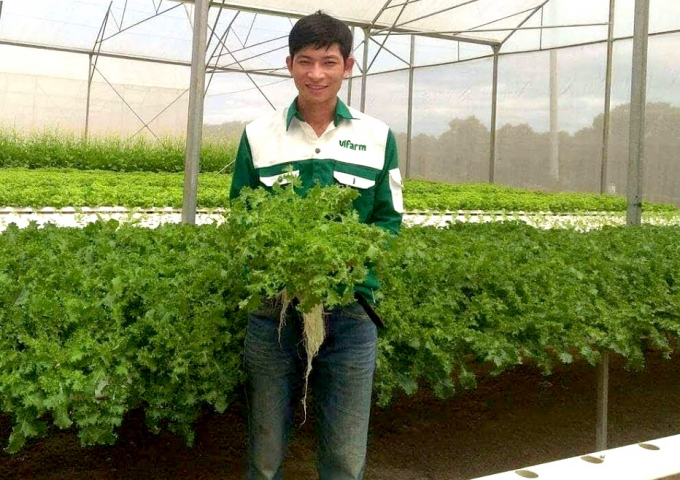
Vegetables in Vifarm can be picked and eaten without washing. Photo: Hong Thuy.
Mr. Tu told us: In 2015, Tu and his friend Cao Xuan Manh, cooperated to build an organic vegetable farm for family use. After days of research, the two decided to choose Israel's vegetable growing technology. Then, ordered a system of equipment that automatically adjusts light, temperature, and automatic irrigation for research and adjustment to match the actual environmental and climate conditions in Vung Tau.
Coir is purchased from the Western provinces, some seeds are from Vietnam, many seeds and micro-fertilizers are imported from abroad. Then they hired an agricultural engineer in charge of the technicalities. They work, learn and experience at the same time.
"Initially, we only tested a few varieties, a little of each type to see if it is suitable with the natural conditions, achieving the expected yield or not, it will be expanded and planted on a large scale if effective', Tu said.
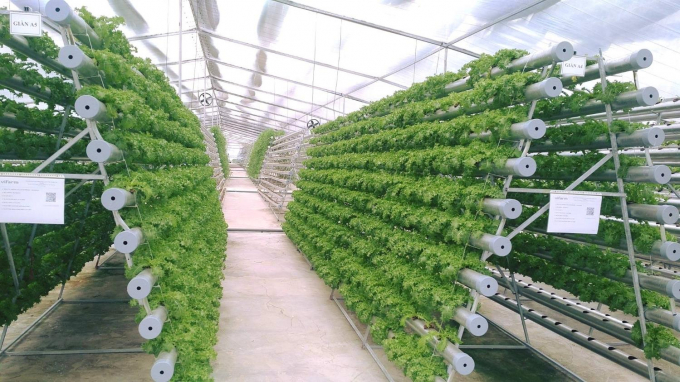
Vifarm's organic vegetable production model requires high investment, but it is an opportunity to expand abroad. Photo: KHT.
Afterwards, vegetables growing became quite convenient and many people ordered it. Seeing that consumers' demand for organic vegetable products is increasing, and the trend is "clean", so from the original idea of self-sufficient growing for the family, Tu and Manh decided to invest in organic vegetables and expanded the area to supply the market. In 2016, they invested in 2 hectares in Long Son commune, Vung Tau City and in 2017 they invested in a 30-hectare farm in Kon Tum province.
Cao Nhat Anh Tu, owner of Vifarm, said that the vegetable and fruit growing areas are protected by greenhouses and Israel's semi-automatic economical irrigation technologies. The entire process, from seeding to the final stage of harvesting and storage, is strictly controlled by computer systems and IoT (Internet of Things) applications. For example, coir before being put into use, must be sterilized by UV irradiation to remove heavy metal components.
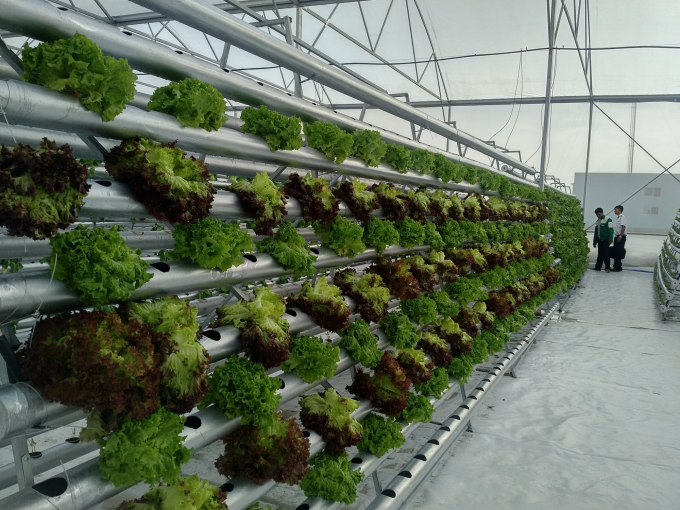
Italian lettuce growing A-frame in the reflux hydroponic vegetable zone at Vifarm is based on Israeli technology but has been improved to suit the actual conditions. Photo: Cao Nhat Anh Tu.
Nutrients for vegetables are mixed according to a programmed, monitored process, following a system that delivers water to the bottom of the plant's supply. With this system, the water will be recirculated after use and re-used until the amount of nutrients in the water drops below the allowed level, then it is put into the treatment tank for re-use.
Information such as temperature, humidity, and light are automatically controlled, creating the best environment for plants to grow. When external factors (such as temperature, humidity, etc.) changes, the computer system will automatically activate to accommodate the essential conditions for vegetables.
"The initial investment for the high-tech model is quite high, but it is the path for sustainable development and the opportunity to reach beyond the borders of Vietnam" Cao Nhat Anh Tu shared.
Currently, all ViFarm products have traceability codes; Safe vegetable standards are tested and confirmed by the Center for Analytical Services and Experimentation of Ho Chi Minh City (CASE).
Although only recently established, Vifarm has achieved a lot of success, becoming the first and largest high-tech farm in Ba Ria - Vung Tau. Vifarm is also selected by Ba Ria - Vung Tau province to participate in the exhibition introducing farm models applying modern science and technology in agricultural production.
Especially, only 2 years after establishment, Vifarm has found the attention of a Singapore-based business and was offered to cooperate. “After connecting and learning about it for a while, we officially signed a cooperation agreement with Singapore DL Edvance PTE LTD Company and became a partner from March 10, 2018”, Cao Nhat Anh Tu said.
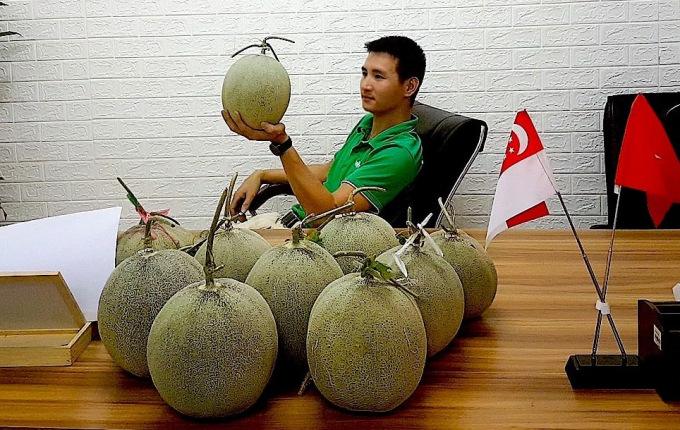
After the success with vegetables, cantaloupe is also a product successfully cultivated by Vifarm with the same safe and organic process, technology. Photo: Minh Sang.
To answer the question: Why does a foreign business choose a new 2-year-old enterprise as a partner? Anh Tu said: Singapore is a country where agricultural land is very small, and operating costs are high.
Therefore, the main reason they chose Vifarm to cooperate, bringing this model to Singapore and other countries around the world is technology. The technology that Vifarm is applying has been improved, has high advantages, it does not consume a lot of energy, is a fully automated system, makes farming more efficient, the model is very suitable suitable for small areas, with little land like Singapore.
For example, with an area of 52 hydroponic vegetable rigs, if grown by traditional methods, an area of 1.2 - 1.4 ha is required.
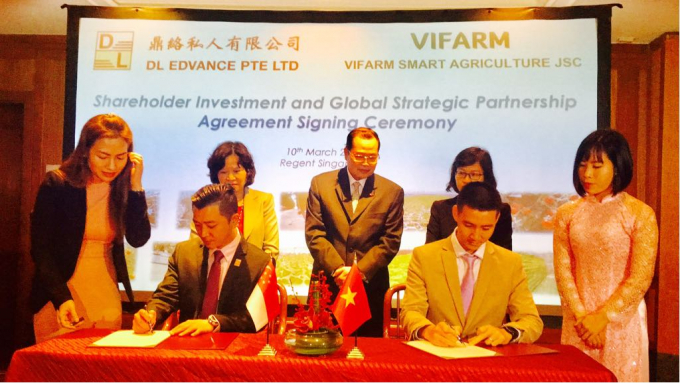
Only 2 years after establishment, Vifarm found the opportunity to cooperate with foreign partners, the opportunity to reach out to the world. In the photo: Signing ceremony of cooperation between Vifarm and the Singaporean partner in 2018. Photo: HT.
In addition, the product has been confirmed in terms of quality. Vifarm has the advantage of bringing high technology into traditional agricultural production, producing high quality and homogenous products, reducing costs for operation as well as human resourses and businesses.
Cao Nhat Anh Tu said that the application of high technology in traditional agricultural production will make the production of clean vegetables and agricultural products in Singapore more efficient, bringing higher yields on the same area as well as reducing costs on nutrition, management, operation and cultivation. At the same time, revenues when applying high technology exceeds that of conventional production.
Under the agreement, DL Edvance Singapore Company supports Vifarm in branding, marketing and bringing products to international markets, including agricultural products and technology.
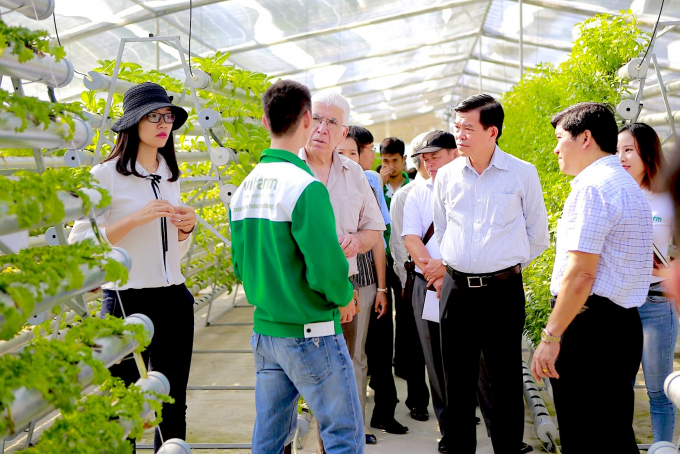
Vifarm often has visitors, including many foreigners, student groups, farmers, startups local and outside the province. Photo: Hong Thuy.
Vifarm will transfer the technology of growing clean vegetables that it is currently applying. Accordingly, Vifarm owns advanced technologies such as a farming system that requires no land, no irrigation, a habitat controlled by a computer system and internet of things (IoT) devices to ensure the best environment for plants.
At the time of signing, Mr. Edwin, Director of Singapore Edvance DL Company, said that the cooperation between the two sides was based on mutual benefits and expressed his wish through his connection network to bring the model not only to Singapore but also to the world.
Currently, Singapore DL Edvance has worked with many partners in countries within the region to deploy this model soon this year.
ViFarm set its mission to promote the high-tech agricultural model, contribute to changing the Vietnamese people mindset in farming, and create an impression for the "made in Vietnam" agricultural product system. In the immediate future, Vifarm has 3 goals: To become one of the leading agricultural product manufacturers and suppliers in Vietnam; Technology, processes and high-tech agricultural equipment transfer; becoming the most "practical" and "effective" high-tech agricultural training institute in Vietnam.
Translated by Nguyen Hai Long
/2025/05/25/4127-3-073637_820.jpg)
(VAN) Thanks to the promotion from an FAO-implemented project, vegetable production in greenhouses in Moc Chau has seen strong development, from 1.5 hectares in 2021 to nearly 50 hectares in 2024.

(VAN) FAO has recently supported USD 140,000 to implement the project 'Risk mitigation human-animal interface risks through disease control initiatives in pig farming.'

(VAN) The People's Committee of Tra Vinh province has approved an adjustment to the investment policy for the Green Hydrogen Plant project, increasing its area to approximately 52.76 hectares.
![Reducing emissions from rice fields: [2] Farmers’ commitment to the soil](https://t.ex-cdn.com/nongnghiepmoitruong.vn/608w/files/news/2025/05/05/dsc08881jpg-nongnghiep-140632.jpg)
(VAN) Clean rice cultivation model in Thuong Tan commune, Bac Tan Uyen district, is assisting local residents in achieving sustainable agriculture by substantially reducing costs, increasing productivity, and protecting the environment.

(VAN) At the conference to disseminate Resolution No. 68, AgriS introduced its digital agricultural ecosystem and reaffirmed its commitment to accompanying the Government in promoting private sector development and sustainable agriculture.

(VAN) 'Blue Ocean - Blue Foods' initiative is designed to restore marine ecosystems and establish sustainable livelihoods for local communities by cultivating a minimum of 1,000 hectares of cottonii seaweed in the first three years.
/2025/05/21/4642-3-112707_603.jpg)
(VAN) The V-SCOPE project has made direct contributions to three out of six pillars of the Comprehensive Strategic Partnership between Vietnam and Australia.